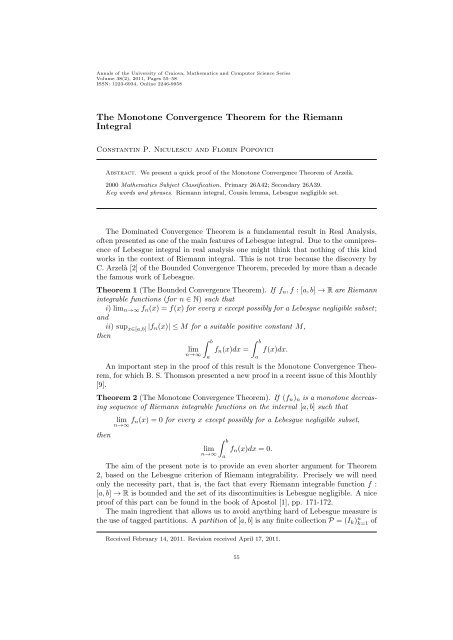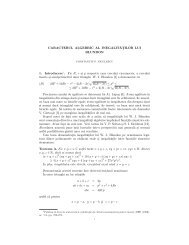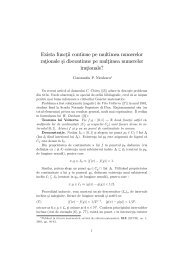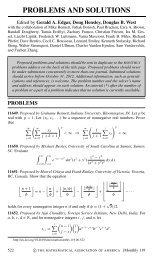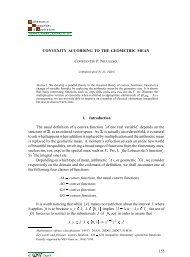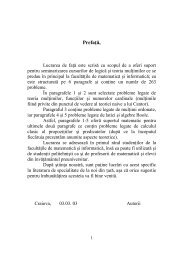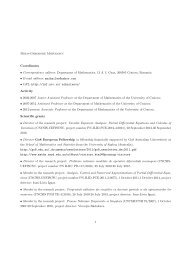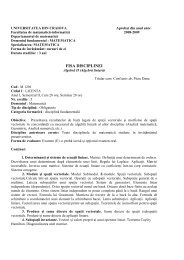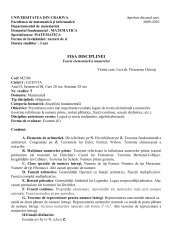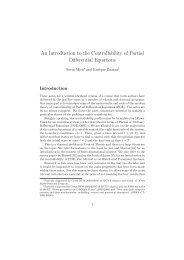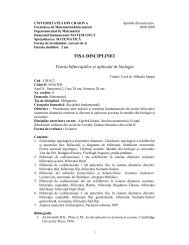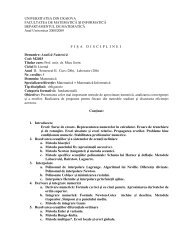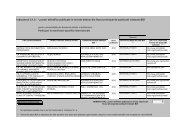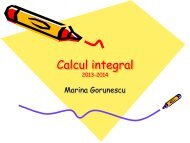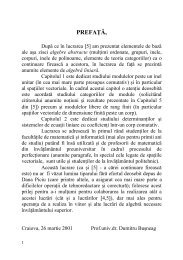The Monotone Convergence Theorem for the Riemann Integral
The Monotone Convergence Theorem for the Riemann Integral
The Monotone Convergence Theorem for the Riemann Integral
You also want an ePaper? Increase the reach of your titles
YUMPU automatically turns print PDFs into web optimized ePapers that Google loves.
THE MONOTONE CONVERGENCE THEOREM FOR THE RIEMANN INTEGRAL 57whereandandPuta = x 0 < x 1 < ... < x N = bz k ∈ [x k−1 , x k ], k = 1, ..., N[x k−1 , x k ] ⊂ (z k − δ(z k ), z k + δ(z k )) <strong>for</strong> k = 1, ..., N.n ε = max {n(ε, z k ) : k = 1, ..., N}∆ = ([x k−1 , x k ]) N k=1.<strong>The</strong>n <strong>for</strong> n ≥ n ε and arbitrary tags t k ∈ [x k−1 , x k ] (k = 1, ..., N) we haveN∑σ ∆ (f n , (t k ) k ) = f n (t k )(x k − x k−1 )<strong>The</strong>re<strong>for</strong>e∫ bak=1= ∑{k:z k ∈B}< M ·f n (t k )(x k − x k−1 ) +∑{k:z k /∈B}ε4M + ε4(b − a) · (b − a) = ε 2 .f n (t k )(x k − x k−1 )f n (x)dx ≤ S ∆ (f n ) = sup{σ ∆ (f n , (t k ) k ) : t k ∈ [x k−1 , x k ] <strong>for</strong> k = 1, ..., N}≤ ε 2 < ε,whence lim n→∞∫ ba f n(x)dx = 0.Unlike <strong>the</strong> case of Lebesgue integral, <strong>The</strong>orem 1 (as well as <strong>the</strong> variant of <strong>The</strong>orem2 with a nonzero limit) provides only an instance when <strong>the</strong> limit and <strong>the</strong> integralpermute. <strong>The</strong> (<strong>Riemann</strong>) integrability of <strong>the</strong> limit f cannot be eliminated from <strong>the</strong>hypo<strong>the</strong>sis (and obtained as a consequence of i) & ii)). In o<strong>the</strong>r words, <strong>the</strong>se <strong>the</strong>oremsdo not provide criteria of integrability.Finally it is worth to mention o<strong>the</strong>r papers which treat (under different degreesof generality) <strong>the</strong> subject of bounded convergence: [4], [6], [7], [8]. <strong>The</strong> last papercontains also a good summary of <strong>the</strong> history of this subject.References[1] T. Apostol, Ma<strong>the</strong>matical Analysis, 2nd edition, Addison-Wesley, Reading, MA., 1974.[2] C. Arzelà, Sulla integrazione per serie, Atti Acc. Lincei Rend., Rome 1 (1885), 532–537, 596–599.[3] R.G. Bartle, A Modern <strong>The</strong>ory of Integration, Graduate Studies in Math. no. 32, <strong>The</strong> AmericanMa<strong>the</strong>matical Society, R. I., 2001.[4] F. Cunningham, Jr., Taking Limits under <strong>the</strong> <strong>Integral</strong> Sign, Ma<strong>the</strong>matics Magazine 40 (1967),No. 4, 179–186.[5] R.A. Gordon, <strong>The</strong> Use of Tagged Partitions in Elementary Real Analysis, <strong>The</strong> American Ma<strong>the</strong>maticalMonthly 105 (1998), No. 2, 107–117.[6] R.A. Gordon, A <strong>Convergence</strong> <strong>The</strong>orem <strong>for</strong> <strong>the</strong> <strong>Riemann</strong> <strong>Integral</strong>, Ma<strong>the</strong>matics Magazine 73(2000), No. 2, 141–147.[7] J.W. Lewin, A Truly Elementary Approach to <strong>the</strong> Bounded <strong>Convergence</strong> <strong>The</strong>orem, <strong>The</strong> AmericanMa<strong>the</strong>matical Monthly 93 (1986), No. 5, 395–397.[8] W.A.J. Luxemburg, Arzela’s Dominated <strong>Convergence</strong> <strong>The</strong>orem <strong>for</strong> <strong>the</strong> <strong>Riemann</strong> <strong>Integral</strong>, <strong>The</strong>American Ma<strong>the</strong>matical Monthly 78 (1971), No. 9, 970–979.□
58 C.P. NICULESCU AND F. POPOVICI[9] B.S. Thomson, <strong>Monotone</strong> <strong>Convergence</strong> <strong>The</strong>orem <strong>for</strong> <strong>the</strong> <strong>Riemann</strong> <strong>Integral</strong>, <strong>The</strong> Amer. Math.Monthly 117 (2010), 547–550.(Constantin P. Niculescu) University of Craiova, Department of Ma<strong>the</strong>matics, Craiova,RO-200585, ROMANIAE-mail address: cniculescu47@yahoo.com(Florin Popovici) College Grigore Moisil, Braşov, RomaniaE-mail address: popovici.florin@yahoo.com


